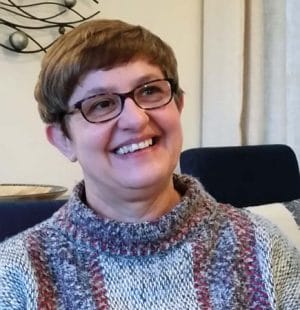
Jul 13, 2017 | Focolare Worldwide, Senza categoria
 Elisa lives in the Focolare Centre in Welwyn Garden City, 35km north of London, in the County of Hertfordshire. It is a “garden city”, founded in the 1920s, with graceful neo-Georgian buildings, roses around the porches, tree-lined avenues. She recounts: “I was born in Northern Italy in a small village. The nearest city was Novara. I am the eldest and I have two brothers. My family was a very Christian family and gave us all solid values, such as always thinking of others. I was twenty, I had just finished studying and I was looking for a job. I studied French and English. Finding a job in a small town was difficult and I was very discouraged. Then a friend invited me to a meeting where plans were being made to go to a Genfest in Rome, a huge youth festival of the Focolare Movement at the Flaminio Stadium. It was May 1980. I went just to get away for the weekend. Instead I was was taken aback by the scene that met me, posters talking about a united world and tens of thousands of young people. During the first break I was in tears because I knew I had found something precious. I kept in touch with those people. I can’t put my finger on it but there was something that attracted me to the point that I went to every meeting. I started to visit the Focolare centre and gradually inside of I started to understand what I wanted to do with my life. It was to give my life to God through the Focolare. I got a job with Caritas, the social action of the Diocese. It was challenging and interesting. After three years I was asked by the Focolare to transfer to Bologna. But the priest tried to convince me not to leave. On that day, the Gospel reading at Mass said ‘Those who do not leave mother, father, fields… cannot be my disciples’. I felt as if Jesus was speaking directly to me. I left without delay. During the years 1985-1987, I attended the international school of formation in Loppiano (near Florence, Italy). And then … Africa! My first impression was like being in a film because everything was new and different. The next day I went into a chapel and I saw the tabernacle and I said: ‘You’re the same Jesus, I gave my life to you and I find you here too.’ Initially I spent one month in Fontem, Cameroon. Then I went to Nigeria and lived there for twenty years. In Lagos, in 1989, we started a project for girls who wanted to know more about the spirituality of unity. There was a religious sister who offered us accommodation in the staff quarters of her missionary hospital. Then a family gave us a house for five years free of charge. Later we found a piece of land and those same people, together with others, helped us build the first focolare house in Nigeria. Everything about that house came from providence. We started a small business making items in batik as one girl knew how to dye material. Someone in the community gave us some money in order to start it up. Everyone supported us and the project has helped countless girls over the years. In 2002 around one thousand people in Jos, northern Nigeria lost their lives in a clash between Muslims and Christians. No-one could understand how it had happened because these groups had always lived peacefully side by side. Our community asked if the Mariapolis could be held in Jos even though it was still a dangerous situation. There we spoke of dialogue, peace, reconciliation because there were a lot of physical wounds and emotional hurt. People had lost their businesses, places of worship had been destroyed. There was a lady invited by her sister and was one of the people inciting the boys from her village to fight against the rebels. At the end of the Mariapolis she said she had understood that violence was not the answer. The Bishop also came to the Mariapolis and was planning to undertake a reconciliation process for a month going from village to village. I subsequently went to Douala (Cameroon) where I lived for six years. Then, in 2013, I arrived in Great Britain and am now living in Welwyn Garden City. In my first year here it snowed from February to April! While externally everything is different, nothing has changed. Wherever God wants you to be, that is your home.” Source: New City Magazine (UK)
Elisa lives in the Focolare Centre in Welwyn Garden City, 35km north of London, in the County of Hertfordshire. It is a “garden city”, founded in the 1920s, with graceful neo-Georgian buildings, roses around the porches, tree-lined avenues. She recounts: “I was born in Northern Italy in a small village. The nearest city was Novara. I am the eldest and I have two brothers. My family was a very Christian family and gave us all solid values, such as always thinking of others. I was twenty, I had just finished studying and I was looking for a job. I studied French and English. Finding a job in a small town was difficult and I was very discouraged. Then a friend invited me to a meeting where plans were being made to go to a Genfest in Rome, a huge youth festival of the Focolare Movement at the Flaminio Stadium. It was May 1980. I went just to get away for the weekend. Instead I was was taken aback by the scene that met me, posters talking about a united world and tens of thousands of young people. During the first break I was in tears because I knew I had found something precious. I kept in touch with those people. I can’t put my finger on it but there was something that attracted me to the point that I went to every meeting. I started to visit the Focolare centre and gradually inside of I started to understand what I wanted to do with my life. It was to give my life to God through the Focolare. I got a job with Caritas, the social action of the Diocese. It was challenging and interesting. After three years I was asked by the Focolare to transfer to Bologna. But the priest tried to convince me not to leave. On that day, the Gospel reading at Mass said ‘Those who do not leave mother, father, fields… cannot be my disciples’. I felt as if Jesus was speaking directly to me. I left without delay. During the years 1985-1987, I attended the international school of formation in Loppiano (near Florence, Italy). And then … Africa! My first impression was like being in a film because everything was new and different. The next day I went into a chapel and I saw the tabernacle and I said: ‘You’re the same Jesus, I gave my life to you and I find you here too.’ Initially I spent one month in Fontem, Cameroon. Then I went to Nigeria and lived there for twenty years. In Lagos, in 1989, we started a project for girls who wanted to know more about the spirituality of unity. There was a religious sister who offered us accommodation in the staff quarters of her missionary hospital. Then a family gave us a house for five years free of charge. Later we found a piece of land and those same people, together with others, helped us build the first focolare house in Nigeria. Everything about that house came from providence. We started a small business making items in batik as one girl knew how to dye material. Someone in the community gave us some money in order to start it up. Everyone supported us and the project has helped countless girls over the years. In 2002 around one thousand people in Jos, northern Nigeria lost their lives in a clash between Muslims and Christians. No-one could understand how it had happened because these groups had always lived peacefully side by side. Our community asked if the Mariapolis could be held in Jos even though it was still a dangerous situation. There we spoke of dialogue, peace, reconciliation because there were a lot of physical wounds and emotional hurt. People had lost their businesses, places of worship had been destroyed. There was a lady invited by her sister and was one of the people inciting the boys from her village to fight against the rebels. At the end of the Mariapolis she said she had understood that violence was not the answer. The Bishop also came to the Mariapolis and was planning to undertake a reconciliation process for a month going from village to village. I subsequently went to Douala (Cameroon) where I lived for six years. Then, in 2013, I arrived in Great Britain and am now living in Welwyn Garden City. In my first year here it snowed from February to April! While externally everything is different, nothing has changed. Wherever God wants you to be, that is your home.” Source: New City Magazine (UK)
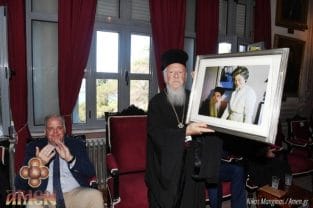
Jul 12, 2017 | Focolare Worldwide, Senza categoria
Fi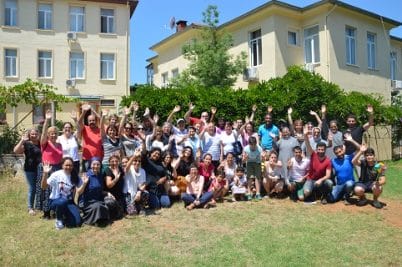 fty years have passed since that first quiet meeting which would produce unimagined openings between the Ecumenical Patriarch of the Orthodox Church and the Focolare Movement – They write from the Focolare of Istanbul -. A few weeks ago Metropolitan Gennadios Zervos said it in this way: “Up until today the full importance of that encounter has not yet been appreciated” (see Quel dialogo volute da Dio). We can have some sense of the vital force of that seed when we consider the first Honorary Doctorate in Culture and Unity that was conferred on Patriarch Bartholomew by Sophia University Institute in Loppiano, Italy, last October. That led to a project that is now a reality and enriches the formative offerings of the Institute with a permanent Chair for dialogue between the Orthodox Church and the Catholic Church, named after Patriarch Athenagoras and Chiara Lubich. On June 13th, the actual anniversary of their meeting, several of us gathered spontaneously at the Orthodox Patriarchate in Fanar. In front of the beautiful icon of Mary we concluded the day with the Magnificat, our song of thanksgiving: “The Mighty One has done great things…Holy is His Name.” But it was also a golden anniversary at the local Mariapolis held in Istanbul. Just as Pope Francis had visited the Mariapolis in the city of Rome last year, this year the citizens of the Mariapolis in Istanbul were joyfully honored by the visit of Patriarch Bartholomew. The School of Theology on the island of Halki with its splendid park provided the backdrop of an unforgettable celebration.
fty years have passed since that first quiet meeting which would produce unimagined openings between the Ecumenical Patriarch of the Orthodox Church and the Focolare Movement – They write from the Focolare of Istanbul -. A few weeks ago Metropolitan Gennadios Zervos said it in this way: “Up until today the full importance of that encounter has not yet been appreciated” (see Quel dialogo volute da Dio). We can have some sense of the vital force of that seed when we consider the first Honorary Doctorate in Culture and Unity that was conferred on Patriarch Bartholomew by Sophia University Institute in Loppiano, Italy, last October. That led to a project that is now a reality and enriches the formative offerings of the Institute with a permanent Chair for dialogue between the Orthodox Church and the Catholic Church, named after Patriarch Athenagoras and Chiara Lubich. On June 13th, the actual anniversary of their meeting, several of us gathered spontaneously at the Orthodox Patriarchate in Fanar. In front of the beautiful icon of Mary we concluded the day with the Magnificat, our song of thanksgiving: “The Mighty One has done great things…Holy is His Name.” But it was also a golden anniversary at the local Mariapolis held in Istanbul. Just as Pope Francis had visited the Mariapolis in the city of Rome last year, this year the citizens of the Mariapolis in Istanbul were joyfully honored by the visit of Patriarch Bartholomew. The School of Theology on the island of Halki with its splendid park provided the backdrop of an unforgettable celebration. 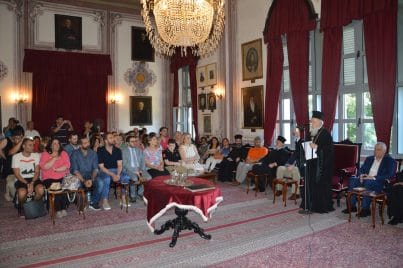 On Sunday, June 25th, the Mariapolites from a variety of confessions, nationalities and languages, went up to the hall where Patriarch Bartholomew gave his speech: “We are now talking about a story that is fifty years old, of a very strong bond between the Greek Patriarchate and the Focolare Movement. And we can by now call it a tradition, because Our predecessor Patriarch Demetrios had continued the relationship with Chiara and the Movement. And We have continued and brought forward that tradition for 26 years. We are very happy and it is a cause of great joy for Us that the major part of the years of this tradition were spent with Us.” We are not new to such expressions of affection and esteem from the Patriarch, but he always manages to surprise us. His joy because of the part he played for 26 years out of 50 is no formality, he told us! And speaking off-the-cuff he added: “But already before being patriarch, working beside my predecessors, I lovingly served this relationship. He went on to say: “I see that the good God has blessed you, because your number and your service have grown, because with the life and testament of Chiara that you have embraced, you give service to all humanity with the same pure heart, with the same faith, with the same love and with the same industriousness [as Chiara]. Like the blessing of Pope Francis, so too Our blessing and Our prayer is with you always that you might sow seeds of peace and of love in people’s hearts. May God always lead your steps toward good works.”
On Sunday, June 25th, the Mariapolites from a variety of confessions, nationalities and languages, went up to the hall where Patriarch Bartholomew gave his speech: “We are now talking about a story that is fifty years old, of a very strong bond between the Greek Patriarchate and the Focolare Movement. And we can by now call it a tradition, because Our predecessor Patriarch Demetrios had continued the relationship with Chiara and the Movement. And We have continued and brought forward that tradition for 26 years. We are very happy and it is a cause of great joy for Us that the major part of the years of this tradition were spent with Us.” We are not new to such expressions of affection and esteem from the Patriarch, but he always manages to surprise us. His joy because of the part he played for 26 years out of 50 is no formality, he told us! And speaking off-the-cuff he added: “But already before being patriarch, working beside my predecessors, I lovingly served this relationship. He went on to say: “I see that the good God has blessed you, because your number and your service have grown, because with the life and testament of Chiara that you have embraced, you give service to all humanity with the same pure heart, with the same faith, with the same love and with the same industriousness [as Chiara]. Like the blessing of Pope Francis, so too Our blessing and Our prayer is with you always that you might sow seeds of peace and of love in people’s hearts. May God always lead your steps toward good works.”  His speech was followed by an exchange of gifts, which included a framed photo of Athenagoras and Chiara during one of their meetings. Everyone then sang in several languages, including Greek, the Focolare song Love and you’ll understand which was a favorite song of Patriarch Athenagoras and describes the essence of the Mariapolis: the light that comes from loving. The Patriarch invited everyone to an exquisite lunch in the adjoining dining room and the morning concluded with the official photos, selfies and conversations with Bartholomew. “Golden is the inheritance left to us by Patriarch Athenagoras and Chiara, the protagonists and initiators of the ‘dialogue of Love,’ great creators of the dialogue of the people (…) initiators of the new ecumenical Era; they taught peoples, giving them courage, strength, patience, fidelity, willingness, love and unity” (Metropolitan Gennadios Zervos).
His speech was followed by an exchange of gifts, which included a framed photo of Athenagoras and Chiara during one of their meetings. Everyone then sang in several languages, including Greek, the Focolare song Love and you’ll understand which was a favorite song of Patriarch Athenagoras and describes the essence of the Mariapolis: the light that comes from loving. The Patriarch invited everyone to an exquisite lunch in the adjoining dining room and the morning concluded with the official photos, selfies and conversations with Bartholomew. “Golden is the inheritance left to us by Patriarch Athenagoras and Chiara, the protagonists and initiators of the ‘dialogue of Love,’ great creators of the dialogue of the people (…) initiators of the new ecumenical Era; they taught peoples, giving them courage, strength, patience, fidelity, willingness, love and unity” (Metropolitan Gennadios Zervos).

Jul 3, 2017 | Focolare Worldwide, Senza categoria
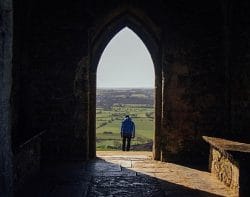 How many times must we forgive? “Three years ago my elder brother came to the house and offended my wife while I was away at work, When I returned home I got very angry, but together, we decided not to react. We then discovered that his daughter, who at that time, was living with us, returned to her house saying that she had to prepare lunch by herself. Besides, to our great surprise, my brother started to recount to the other people in our community that we had insulted him and that he would have forgiven us only if we asked his pardon. At this point this was just too much for us and for a year we no longer spoke to each other. One day I remembered that Jesus had taught us to forgive seventy times seven, in whatever situation we would encounter and even pray for our enemies. So, on the last day of the year, I organised a meeting of reconciliation, in the presence of all the enlarged family. . I was the first to speak, I told the members of the family that we were not there to give long speeches, or to judge one another, but simply to ask my elder brother’s forgiveness and that we were sorry for having offended him. Then I got up and knelt in front of him, in a gesture of humility and goodness of heart, two Christian virtues. The members of the family, including my brother, were so surprised and taken aback by this gesture, and none of them dared to speak. After a few minutes he told me that he had forgiven me. We returned home happy and serene for having re-established peace among our families. (Christopher and Perpetua Idu – Africa)
How many times must we forgive? “Three years ago my elder brother came to the house and offended my wife while I was away at work, When I returned home I got very angry, but together, we decided not to react. We then discovered that his daughter, who at that time, was living with us, returned to her house saying that she had to prepare lunch by herself. Besides, to our great surprise, my brother started to recount to the other people in our community that we had insulted him and that he would have forgiven us only if we asked his pardon. At this point this was just too much for us and for a year we no longer spoke to each other. One day I remembered that Jesus had taught us to forgive seventy times seven, in whatever situation we would encounter and even pray for our enemies. So, on the last day of the year, I organised a meeting of reconciliation, in the presence of all the enlarged family. . I was the first to speak, I told the members of the family that we were not there to give long speeches, or to judge one another, but simply to ask my elder brother’s forgiveness and that we were sorry for having offended him. Then I got up and knelt in front of him, in a gesture of humility and goodness of heart, two Christian virtues. The members of the family, including my brother, were so surprised and taken aback by this gesture, and none of them dared to speak. After a few minutes he told me that he had forgiven me. We returned home happy and serene for having re-established peace among our families. (Christopher and Perpetua Idu – Africa)  Pearl of great price I was living through a really hard marriage. My husband developed an alcohol addiction due to having served in the Army. Shortly after coming back to England and eating fairly normally again, he developed a duodenal ulcer, which gave him appalling abdominal pain and appeared to be incurable. It was then that he discovered alcohol as an effective pain killer. I lived through this horrific time with him. I only speak of all this because I need to describe how I found myself physically and mentally at the end of my tether. I spoke with various doctors and professionals but they were unable to help either him or me. I hadn’t yet discovered Alcoholics Anonymous. A year or so later we met the Focolare Movement. At the event I ended up writing to someone in the Focolare community that I really respected and trusted. I told him about the impossibility of our lives. His response was: “Thank you for sharing with me your ‘pearl of great price’..”’ I was aghast. How could all the huge difficulties that I had described to him be called my ‘pearl of great price’? It took me years to begin to understand how to turn suffering into love, to ‘let go’ of everything I thought was necessary in order to be accepted socially; to make things tidy and whitewashed. To be honest, to be able to say my ‘yes’ rather than ‘no’. I began to understand the innumerable things that make up one’s ego! Now in my old age I am beginning to discover or rather I have a ‘murmur’ of what it is to experience what ‘melt down’ means. It’s an absolute surrender, allowing God to wrap me in his arms and to let him do all the work. Before he died, my husband had a direct experience of Jesus’ love and never drank again. Also I was released from depression. All this has taken years, most of my life really. But it certainly was and is my ‘pearl of great price’ – truly. Source: New City (London)
Pearl of great price I was living through a really hard marriage. My husband developed an alcohol addiction due to having served in the Army. Shortly after coming back to England and eating fairly normally again, he developed a duodenal ulcer, which gave him appalling abdominal pain and appeared to be incurable. It was then that he discovered alcohol as an effective pain killer. I lived through this horrific time with him. I only speak of all this because I need to describe how I found myself physically and mentally at the end of my tether. I spoke with various doctors and professionals but they were unable to help either him or me. I hadn’t yet discovered Alcoholics Anonymous. A year or so later we met the Focolare Movement. At the event I ended up writing to someone in the Focolare community that I really respected and trusted. I told him about the impossibility of our lives. His response was: “Thank you for sharing with me your ‘pearl of great price’..”’ I was aghast. How could all the huge difficulties that I had described to him be called my ‘pearl of great price’? It took me years to begin to understand how to turn suffering into love, to ‘let go’ of everything I thought was necessary in order to be accepted socially; to make things tidy and whitewashed. To be honest, to be able to say my ‘yes’ rather than ‘no’. I began to understand the innumerable things that make up one’s ego! Now in my old age I am beginning to discover or rather I have a ‘murmur’ of what it is to experience what ‘melt down’ means. It’s an absolute surrender, allowing God to wrap me in his arms and to let him do all the work. Before he died, my husband had a direct experience of Jesus’ love and never drank again. Also I was released from depression. All this has taken years, most of my life really. But it certainly was and is my ‘pearl of great price’ – truly. Source: New City (London)
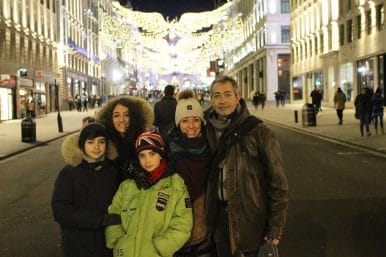
Jun 16, 2017 | Senza categoria
 When we started seeing each other, Hani and I were very much aware of the differences that existed between us, especially with regards to doctrine. But we felt that our love was stronger than any difference; this gave us the courage to believe that there was a special plan of God for our marriage that went beyond us. Through the spirituality of the Focolare Movement, which we had both got to know in our youth, we learnt that in order to reach unity we had to aim at what unites us – which is considerable – rather than looking at what divides us. Of course, when we go our separate ways for Sunday Service, it’s always a suffering, as when unintentionally we might refer to “us” and “you” in our discussions, or when our human reasoning wants to criticise the Church of the other. When this happens, we realise that unity isn’t built once and for all, but that each day God asks us to choose to love the church of the other as our own. Furthermore, we have learnt that each time we experience disunity, it’s an opportunity for us to offer this pain to God for the complete unity among Christians. There are times, however, in order to live unity more fully among us and in our family, when we might attend either one Church or the other all together, and to take part in some of the spiritual practices, such as fasting for example. An important moment for us was the baptism of our first child. We discussed the issue at length, but we could not decide which was the right thing: whether to have a Catholic or Orthodox baptism. While the Sacrament was the same for both Churches, the consequences would have been profoundly different. Hani, in fact, is a deacon and he was temporarily removed from his Church because of his mixed marriage. A Catholic baptism for our child would have put him in a difficult situation. We found it hard to make a decision, but then I realized that I should consult my bishop about it. I went to him and told him the whole situation. I felt welcomed by him and listened to in depth. The bishop was grateful that I had sought his advice and he assured me that he would understand and support any decision that Hani and I took, following our conscience. At that point, it was clear to me that, for the sake of Hani and his Church, it was best to have an Orthodox baptism. On this occasion, as in many others, it was not a question of making compromises, but to discern God’s will in that circumstance. Naturally this entails making an extra effort, which sometimes costs blood, sweat and tears, also with the children who, when still little, could not understand why they could receive Communion in the Orthodox Church, but not in the Catholic Church. In fact, in the Orthodox Church, the sacraments of communion and confirmation are administered simultaneously during baptism. We went through a rather difficult time last year with our eldest daughter, who was then 15 years old. She started demanding to be more independent and was being aggressive about it. We were unprepared for this sudden change. There were daily quarrels, often quite heated. We wanted to protect her from situations which we considered precarious, but the more we checked up on her, the more she rebelled. I spent so many nights crying for this daughter I felt I no longer knew. It was not easy between us either, because I thought the way Hani handled the situation was not optimum and so we argued a lot. But in all this confusion, we always tried to be faithful to some practices that seemed important to us, such as praying all together, or having the humility to ask pardon when necessary, even with the youngest ones. At a certain point, we realised how important it was to maintain unity between us. We decided to show complete trust in her. The situation improved significantly at home, which confirms that even in a mixed marriage it’s possible for the married couple to “be one in God” and to give this witness to the children and the world around us.
When we started seeing each other, Hani and I were very much aware of the differences that existed between us, especially with regards to doctrine. But we felt that our love was stronger than any difference; this gave us the courage to believe that there was a special plan of God for our marriage that went beyond us. Through the spirituality of the Focolare Movement, which we had both got to know in our youth, we learnt that in order to reach unity we had to aim at what unites us – which is considerable – rather than looking at what divides us. Of course, when we go our separate ways for Sunday Service, it’s always a suffering, as when unintentionally we might refer to “us” and “you” in our discussions, or when our human reasoning wants to criticise the Church of the other. When this happens, we realise that unity isn’t built once and for all, but that each day God asks us to choose to love the church of the other as our own. Furthermore, we have learnt that each time we experience disunity, it’s an opportunity for us to offer this pain to God for the complete unity among Christians. There are times, however, in order to live unity more fully among us and in our family, when we might attend either one Church or the other all together, and to take part in some of the spiritual practices, such as fasting for example. An important moment for us was the baptism of our first child. We discussed the issue at length, but we could not decide which was the right thing: whether to have a Catholic or Orthodox baptism. While the Sacrament was the same for both Churches, the consequences would have been profoundly different. Hani, in fact, is a deacon and he was temporarily removed from his Church because of his mixed marriage. A Catholic baptism for our child would have put him in a difficult situation. We found it hard to make a decision, but then I realized that I should consult my bishop about it. I went to him and told him the whole situation. I felt welcomed by him and listened to in depth. The bishop was grateful that I had sought his advice and he assured me that he would understand and support any decision that Hani and I took, following our conscience. At that point, it was clear to me that, for the sake of Hani and his Church, it was best to have an Orthodox baptism. On this occasion, as in many others, it was not a question of making compromises, but to discern God’s will in that circumstance. Naturally this entails making an extra effort, which sometimes costs blood, sweat and tears, also with the children who, when still little, could not understand why they could receive Communion in the Orthodox Church, but not in the Catholic Church. In fact, in the Orthodox Church, the sacraments of communion and confirmation are administered simultaneously during baptism. We went through a rather difficult time last year with our eldest daughter, who was then 15 years old. She started demanding to be more independent and was being aggressive about it. We were unprepared for this sudden change. There were daily quarrels, often quite heated. We wanted to protect her from situations which we considered precarious, but the more we checked up on her, the more she rebelled. I spent so many nights crying for this daughter I felt I no longer knew. It was not easy between us either, because I thought the way Hani handled the situation was not optimum and so we argued a lot. But in all this confusion, we always tried to be faithful to some practices that seemed important to us, such as praying all together, or having the humility to ask pardon when necessary, even with the youngest ones. At a certain point, we realised how important it was to maintain unity between us. We decided to show complete trust in her. The situation improved significantly at home, which confirms that even in a mixed marriage it’s possible for the married couple to “be one in God” and to give this witness to the children and the world around us.
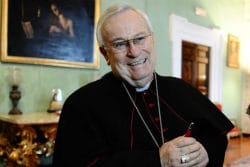
May 25, 2017 | Focolare Worldwide, Senza categoria
 Maria Voce says that it was “with great pleasure” that she learnt of Cardinal Gualtiero Bassetti’s appointment as new President of the Italian Episcopal Conference (CEI) on May 24, 2017. In a letter congratulating him, the President of the Focolare Movement expresses her “most sincere wishes for this prestigious assignment, a clear sign of trust on behalf of the Holy Father.” “His sense of collegiality and love, which are his trademarks,” continues the President, “will be a great gift for the entire ecclesial and civil community of Italy, especially for those who most resemble Jesus Crucified and Abandoned “. The Focolare Movement in Italy also congratulated the new President of the Bishops’ Conference, saying his appointment is “a source of great joy”. In a press release, it emphasizes his “particular style in always being close to the people, to workers, migrants, families, in their situations of crisis and in their search for truth.” The Movement wishes that he may “experience in this new task an ever-renewed courage to face the countless challenges, comforted by the collegiality which is a witness to the fraternal aspect of the Church.” Born in 1942 in Marradi near Florence, Gualtiero Bassetti was ordained a priest in 1966. In 1994 he was appointed Bishop of Massa Marittima, then Bishop of Arezzo (1998) and in 2009 Archbishop of Perugia. In 2014, Pope Francis welcomed him into the College of Cardinals.
Maria Voce says that it was “with great pleasure” that she learnt of Cardinal Gualtiero Bassetti’s appointment as new President of the Italian Episcopal Conference (CEI) on May 24, 2017. In a letter congratulating him, the President of the Focolare Movement expresses her “most sincere wishes for this prestigious assignment, a clear sign of trust on behalf of the Holy Father.” “His sense of collegiality and love, which are his trademarks,” continues the President, “will be a great gift for the entire ecclesial and civil community of Italy, especially for those who most resemble Jesus Crucified and Abandoned “. The Focolare Movement in Italy also congratulated the new President of the Bishops’ Conference, saying his appointment is “a source of great joy”. In a press release, it emphasizes his “particular style in always being close to the people, to workers, migrants, families, in their situations of crisis and in their search for truth.” The Movement wishes that he may “experience in this new task an ever-renewed courage to face the countless challenges, comforted by the collegiality which is a witness to the fraternal aspect of the Church.” Born in 1942 in Marradi near Florence, Gualtiero Bassetti was ordained a priest in 1966. In 1994 he was appointed Bishop of Massa Marittima, then Bishop of Arezzo (1998) and in 2009 Archbishop of Perugia. In 2014, Pope Francis welcomed him into the College of Cardinals.
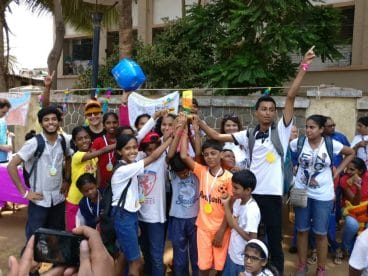
May 12, 2017 | Senza categoria
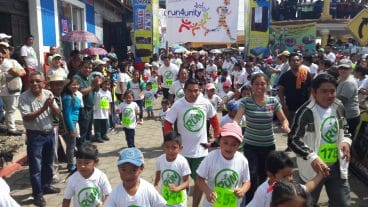 The race flowed through time zones from East to West with a message of brotherhood for the world. It’s Run4Unity, the annual relay race organized by the teenage members of the Focolare Movement. With a time difference of five hours, in Sopron, Hungary, the race charged through the border with Austria where young people from a refugee camp were on their way to meet up with the runners. Jumping over 10 time zones between Mexicali, Mexico and Calexico, USA, a hundred teenagers converged on the wall that separates their two nations. On this day hatred and racism don’t have a country. The race concluded World Unity Week, seven days of projects and events in favour of peace and unity among peoples: from Ecuador and its humanitarian emergency after the earthquake, to Medan, Indonesia, with a concert for peace, to Goma in the Democratic Republic of the Congo and the Amani Music Festival, three days of music-making and dancing for peace. There was a meaningful video message from teenagers in Aleppo, Syria, to their peers in Argentina. Run4Unity is a multi-staged journey that cuts through the planet’s most controversial border crossings between the hours of eleven and twelve o’clock local time. On foot, on a bike, on roller-skates, in boats or standing silently in prayer – once again this year it was the most against-the-current race there has ever been, a prophetic sign of the unity that will one day be ours. In this race willing hearts mattered more than quick feet. Each stop along the way provided sport events solidarity projects, presentations of experiences of active citizenship in places where solitude, poverty and marginalisation are prevalent – all of it to show that a united world is still possible, despite worrying tensions.
The race flowed through time zones from East to West with a message of brotherhood for the world. It’s Run4Unity, the annual relay race organized by the teenage members of the Focolare Movement. With a time difference of five hours, in Sopron, Hungary, the race charged through the border with Austria where young people from a refugee camp were on their way to meet up with the runners. Jumping over 10 time zones between Mexicali, Mexico and Calexico, USA, a hundred teenagers converged on the wall that separates their two nations. On this day hatred and racism don’t have a country. The race concluded World Unity Week, seven days of projects and events in favour of peace and unity among peoples: from Ecuador and its humanitarian emergency after the earthquake, to Medan, Indonesia, with a concert for peace, to Goma in the Democratic Republic of the Congo and the Amani Music Festival, three days of music-making and dancing for peace. There was a meaningful video message from teenagers in Aleppo, Syria, to their peers in Argentina. Run4Unity is a multi-staged journey that cuts through the planet’s most controversial border crossings between the hours of eleven and twelve o’clock local time. On foot, on a bike, on roller-skates, in boats or standing silently in prayer – once again this year it was the most against-the-current race there has ever been, a prophetic sign of the unity that will one day be ours. In this race willing hearts mattered more than quick feet. Each stop along the way provided sport events solidarity projects, presentations of experiences of active citizenship in places where solitude, poverty and marginalisation are prevalent – all of it to show that a united world is still possible, despite worrying tensions.  In Penang, West Malaysia, Run4Unity was a Unity Walk, an 8km trek that drew in 1200 people of all ages and belonging to different ethnic, cultural and religious groups: Hindus, Muslims, Sikhs, Christians and Buddhists. In India the race expressed its desire for peace as it flowed through downtown New Dehli, from Gandhi to Smirti where Mahatma Gandhi was murdered in 1948 and is now a sacred site, then on to the India Gate monument that is dedicated to soldiers who never returned from war. In Dresden, Germany, Run4Unity was held as part of the Pulse of Europe event, which was meant to encourage citizens to listen to the heartbeat of Europe. In Columbus, USA, Run4Unity was held at a centre for at risk people. It included games, messages of peace and sharing the Golden Rule. Then they cleaned the streets and shared sandwiches with the homeless. In Santa Lucia Utatlàn, Guatemala, the race was an opportunity for a multi-cultural event that brought together a thousand people from different ethnic groups, including youngsters from the Maya community of Quiché. In Iglesias, Italy, Run4Unity took on a rather different form: Disarmament Awareness. There are two bombs and weapons factories in the region, which produce arms to be used in today’s wars. Teenagers around the globe imagine a different kind world, one without wars, walls and hatred. Their message has also gone viral online. Radioimmaginaria, the first European radio station run exclusively for and by teenagers, dedicated live direct coverage of the Run4Unity events around the world. Because, they say, “at fifteen years of age you’re allowed to imagine the world of the future.”
In Penang, West Malaysia, Run4Unity was a Unity Walk, an 8km trek that drew in 1200 people of all ages and belonging to different ethnic, cultural and religious groups: Hindus, Muslims, Sikhs, Christians and Buddhists. In India the race expressed its desire for peace as it flowed through downtown New Dehli, from Gandhi to Smirti where Mahatma Gandhi was murdered in 1948 and is now a sacred site, then on to the India Gate monument that is dedicated to soldiers who never returned from war. In Dresden, Germany, Run4Unity was held as part of the Pulse of Europe event, which was meant to encourage citizens to listen to the heartbeat of Europe. In Columbus, USA, Run4Unity was held at a centre for at risk people. It included games, messages of peace and sharing the Golden Rule. Then they cleaned the streets and shared sandwiches with the homeless. In Santa Lucia Utatlàn, Guatemala, the race was an opportunity for a multi-cultural event that brought together a thousand people from different ethnic groups, including youngsters from the Maya community of Quiché. In Iglesias, Italy, Run4Unity took on a rather different form: Disarmament Awareness. There are two bombs and weapons factories in the region, which produce arms to be used in today’s wars. Teenagers around the globe imagine a different kind world, one without wars, walls and hatred. Their message has also gone viral online. Radioimmaginaria, the first European radio station run exclusively for and by teenagers, dedicated live direct coverage of the Run4Unity events around the world. Because, they say, “at fifteen years of age you’re allowed to imagine the world of the future.”

 Elisa lives in the Focolare Centre in Welwyn Garden City, 35km north of London, in the County of Hertfordshire. It is a “garden city”, founded in the 1920s, with graceful neo-Georgian buildings, roses around the porches, tree-lined avenues. She recounts: “I was born in Northern Italy in a small village. The nearest city was Novara. I am the eldest and I have two brothers. My family was a very Christian family and gave us all solid values, such as always thinking of others. I was twenty, I had just finished studying and I was looking for a job. I studied French and English. Finding a job in a small town was difficult and I was very discouraged. Then a friend invited me to a meeting where plans were being made to go to a Genfest in Rome, a huge youth festival of the Focolare Movement at the Flaminio Stadium. It was May 1980. I went just to get away for the weekend. Instead I was was taken aback by the scene that met me, posters talking about a united world and tens of thousands of young people. During the first break I was in tears because I knew I had found something precious. I kept in touch with those people. I can’t put my finger on it but there was something that attracted me to the point that I went to every meeting. I started to visit the Focolare centre and gradually inside of I started to understand what I wanted to do with my life. It was to give my life to God through the Focolare. I got a job with Caritas, the social action of the Diocese. It was challenging and interesting. After three years I was asked by the Focolare to transfer to Bologna. But the priest tried to convince me not to leave. On that day, the Gospel reading at Mass said ‘Those who do not leave mother, father, fields… cannot be my disciples’. I felt as if Jesus was speaking directly to me. I left without delay. During the years 1985-1987, I attended the international school of formation in Loppiano (near Florence, Italy). And then … Africa! My first impression was like being in a film because everything was new and different. The next day I went into a chapel and I saw the tabernacle and I said: ‘You’re the same Jesus, I gave my life to you and I find you here too.’ Initially I spent one month in Fontem, Cameroon. Then I went to Nigeria and lived there for twenty years. In Lagos, in 1989, we started a project for girls who wanted to know more about the spirituality of unity. There was a religious sister who offered us accommodation in the staff quarters of her missionary hospital. Then a family gave us a house for five years free of charge. Later we found a piece of land and those same people, together with others, helped us build the first focolare house in Nigeria. Everything about that house came from providence. We started a small business making items in batik as one girl knew how to dye material. Someone in the community gave us some money in order to start it up. Everyone supported us and the project has helped countless girls over the years. In 2002 around one thousand people in Jos, northern Nigeria lost their lives in a clash between Muslims and Christians. No-one could understand how it had happened because these groups had always lived peacefully side by side. Our community asked if the Mariapolis could be held in Jos even though it was still a dangerous situation. There we spoke of dialogue, peace, reconciliation because there were a lot of physical wounds and emotional hurt. People had lost their businesses, places of worship had been destroyed. There was a lady invited by her sister and was one of the people inciting the boys from her village to fight against the rebels. At the end of the Mariapolis she said she had understood that violence was not the answer. The Bishop also came to the Mariapolis and was planning to undertake a reconciliation process for a month going from village to village. I subsequently went to Douala (Cameroon) where I lived for six years. Then, in 2013, I arrived in Great Britain and am now living in Welwyn Garden City. In my first year here it snowed from February to April! While externally everything is different, nothing has changed. Wherever God wants you to be, that is your home.” Source: New City Magazine (UK)
Elisa lives in the Focolare Centre in Welwyn Garden City, 35km north of London, in the County of Hertfordshire. It is a “garden city”, founded in the 1920s, with graceful neo-Georgian buildings, roses around the porches, tree-lined avenues. She recounts: “I was born in Northern Italy in a small village. The nearest city was Novara. I am the eldest and I have two brothers. My family was a very Christian family and gave us all solid values, such as always thinking of others. I was twenty, I had just finished studying and I was looking for a job. I studied French and English. Finding a job in a small town was difficult and I was very discouraged. Then a friend invited me to a meeting where plans were being made to go to a Genfest in Rome, a huge youth festival of the Focolare Movement at the Flaminio Stadium. It was May 1980. I went just to get away for the weekend. Instead I was was taken aback by the scene that met me, posters talking about a united world and tens of thousands of young people. During the first break I was in tears because I knew I had found something precious. I kept in touch with those people. I can’t put my finger on it but there was something that attracted me to the point that I went to every meeting. I started to visit the Focolare centre and gradually inside of I started to understand what I wanted to do with my life. It was to give my life to God through the Focolare. I got a job with Caritas, the social action of the Diocese. It was challenging and interesting. After three years I was asked by the Focolare to transfer to Bologna. But the priest tried to convince me not to leave. On that day, the Gospel reading at Mass said ‘Those who do not leave mother, father, fields… cannot be my disciples’. I felt as if Jesus was speaking directly to me. I left without delay. During the years 1985-1987, I attended the international school of formation in Loppiano (near Florence, Italy). And then … Africa! My first impression was like being in a film because everything was new and different. The next day I went into a chapel and I saw the tabernacle and I said: ‘You’re the same Jesus, I gave my life to you and I find you here too.’ Initially I spent one month in Fontem, Cameroon. Then I went to Nigeria and lived there for twenty years. In Lagos, in 1989, we started a project for girls who wanted to know more about the spirituality of unity. There was a religious sister who offered us accommodation in the staff quarters of her missionary hospital. Then a family gave us a house for five years free of charge. Later we found a piece of land and those same people, together with others, helped us build the first focolare house in Nigeria. Everything about that house came from providence. We started a small business making items in batik as one girl knew how to dye material. Someone in the community gave us some money in order to start it up. Everyone supported us and the project has helped countless girls over the years. In 2002 around one thousand people in Jos, northern Nigeria lost their lives in a clash between Muslims and Christians. No-one could understand how it had happened because these groups had always lived peacefully side by side. Our community asked if the Mariapolis could be held in Jos even though it was still a dangerous situation. There we spoke of dialogue, peace, reconciliation because there were a lot of physical wounds and emotional hurt. People had lost their businesses, places of worship had been destroyed. There was a lady invited by her sister and was one of the people inciting the boys from her village to fight against the rebels. At the end of the Mariapolis she said she had understood that violence was not the answer. The Bishop also came to the Mariapolis and was planning to undertake a reconciliation process for a month going from village to village. I subsequently went to Douala (Cameroon) where I lived for six years. Then, in 2013, I arrived in Great Britain and am now living in Welwyn Garden City. In my first year here it snowed from February to April! While externally everything is different, nothing has changed. Wherever God wants you to be, that is your home.” Source: New City Magazine (UK) 

 fty years have passed since that first quiet meeting which would produce unimagined openings between the Ecumenical Patriarch of the Orthodox Church and the Focolare Movement –
fty years have passed since that first quiet meeting which would produce unimagined openings between the Ecumenical Patriarch of the Orthodox Church and the Focolare Movement – 

 How many times must we forgive? “Three years ago my elder brother came to the house and offended my wife while I was away at work, When I returned home I got very angry, but together, we decided not to react. We then discovered that his daughter, who at that time, was living with us, returned to her house saying that she had to prepare lunch by herself. Besides, to our great surprise, my brother started to recount to the other people in our community that we had insulted him and that he would have forgiven us only if we asked his pardon. At this point this was just too much for us and for a year we no longer spoke to each other. One day I remembered that Jesus had taught us to forgive seventy times seven, in whatever situation we would encounter and even pray for our enemies. So, on the last day of the year, I organised a meeting of reconciliation, in the presence of all the enlarged family. . I was the first to speak, I told the members of the family that we were not there to give long speeches, or to judge one another, but simply to ask my elder brother’s forgiveness and that we were sorry for having offended him. Then I got up and knelt in front of him, in a gesture of humility and goodness of heart, two Christian virtues. The members of the family, including my brother, were so surprised and taken aback by this gesture, and none of them dared to speak. After a few minutes he told me that he had forgiven me. We returned home happy and serene for having re-established peace among our families. (Christopher and Perpetua Idu –
How many times must we forgive? “Three years ago my elder brother came to the house and offended my wife while I was away at work, When I returned home I got very angry, but together, we decided not to react. We then discovered that his daughter, who at that time, was living with us, returned to her house saying that she had to prepare lunch by herself. Besides, to our great surprise, my brother started to recount to the other people in our community that we had insulted him and that he would have forgiven us only if we asked his pardon. At this point this was just too much for us and for a year we no longer spoke to each other. One day I remembered that Jesus had taught us to forgive seventy times seven, in whatever situation we would encounter and even pray for our enemies. So, on the last day of the year, I organised a meeting of reconciliation, in the presence of all the enlarged family. . I was the first to speak, I told the members of the family that we were not there to give long speeches, or to judge one another, but simply to ask my elder brother’s forgiveness and that we were sorry for having offended him. Then I got up and knelt in front of him, in a gesture of humility and goodness of heart, two Christian virtues. The members of the family, including my brother, were so surprised and taken aback by this gesture, and none of them dared to speak. After a few minutes he told me that he had forgiven me. We returned home happy and serene for having re-established peace among our families. (Christopher and Perpetua Idu – 


